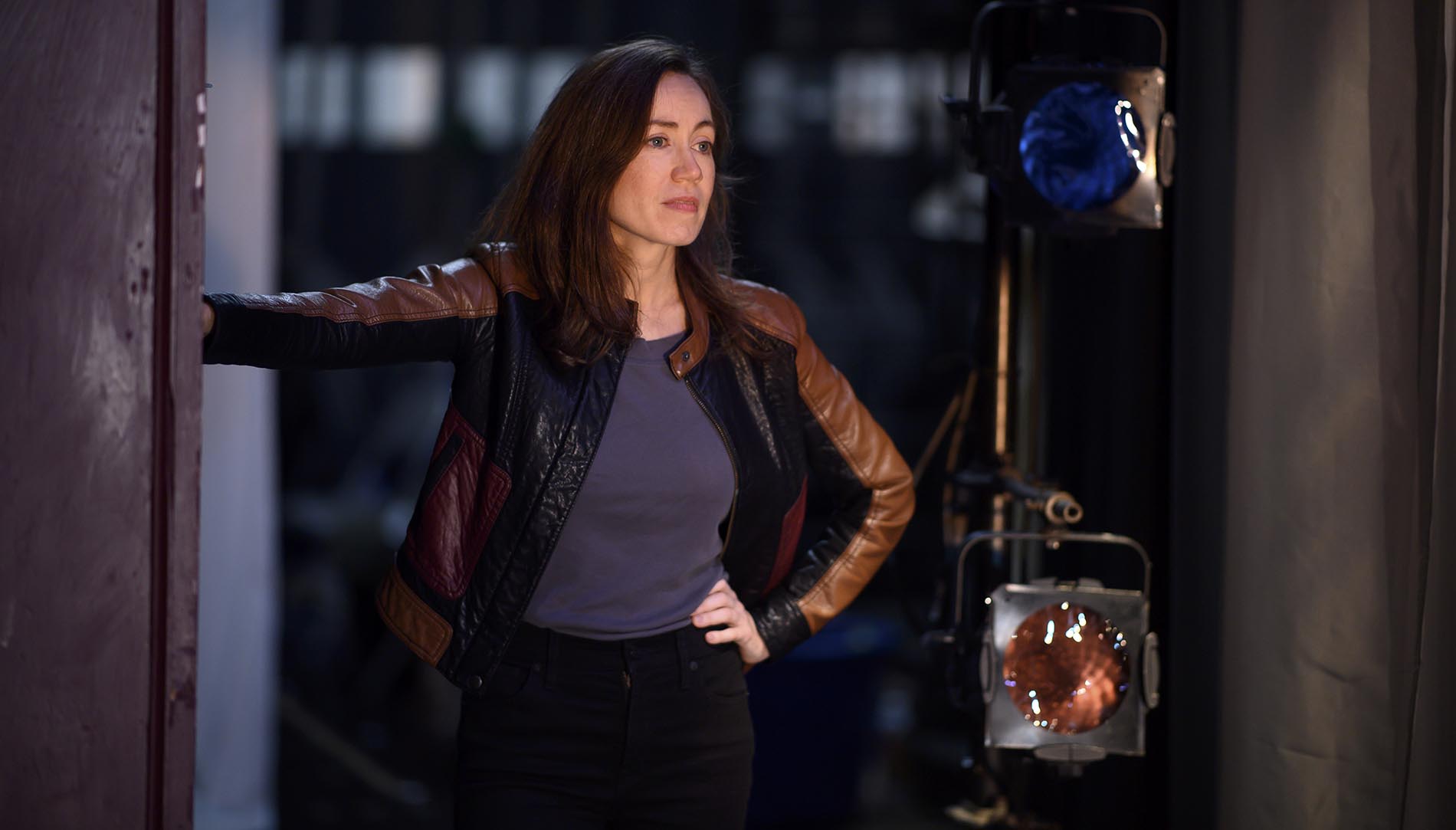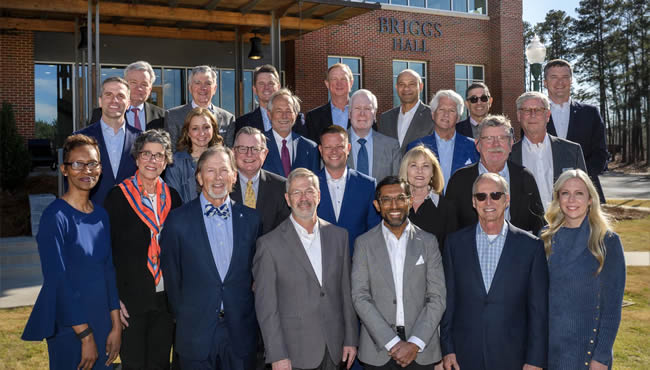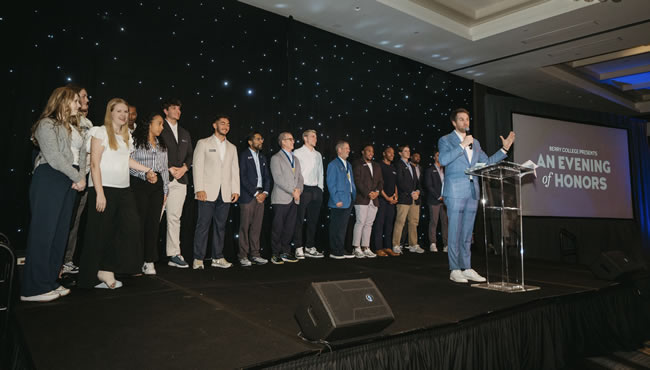By Karilon L. Rogers
When Virginia Kathryn “Katy” Brown (98C) was named producing artistic director of America’s longest-running professional equity theatre in 2019, little did she know one of her earliest, most innovative and celebrated ideas would be having kudzu cleared from a long-decaying drive-in movie theatre on the outskirts of town.
Yet when the COVID-19 pandemic forced the closure of the historic Barter Theatre in Abingdon, Va., in early 2020 for the first time since World War II, it was that stroke of genius that enabled Brown to continue the Barter’s historic tradition of serving the people of Appalachia through the darkest of times.
“My sister works in public health, and I served on Gov. [Ralph] Northam’s COVID-19 Task Force,” Brown explained. “I was fully aware of safety and what was going on with restrictions on businesses. I knew we couldn’t keep the indoor theatre open. So, I spent a lot of time driving around – a lot of time trespassing, really – looking at fields, parking lots and amphitheaters, anyplace we could do outdoor theatre. Nothing worked.”
Then she remembered the Moonlite, a broken-down drive-in built in the 1940s and closed years earlier.
“The neighbors called it Chernobyl,” she remembered. “It was covered in kudzu and poison ivy, and the speaker poles by the car spaces looked as if they’d all been beaten by a baseball bat. But I thought it just might work.”

She brought out a few of her colleagues to test her idea on the craziness meter. They bought right in, and the theatre staff – even many of the 90% who’d been furloughed – jumped in with both feet to clean up and create an outdoor performance space.
“I always said that if the zombie apocalypse comes, I want to be around theatre people,” Brown chuckled. “I didn’t know it would actually happen!”
Soon tradesmen, volunteers and others joined in, their work supported by the generosity of donors and businesses who depend on the Barter to bring tourists to their small town of 8,200. A covered stage went up that is tall enough for cars in the back row to see, and cameras were brought in to project special effects and close-ups of the actors on the movie screen above. Sound was designed to be aired through the car radios of the audience. Actors lived in a quarantine bubble.
Before long, The Wizard of Oz was being performed six nights a week – without an intermission to reduce the need for restroom breaks – sometimes to capacity crowds of 220 cars with families safely ensconced inside. Honking horns and blinking headlights signaled appreciation for the actors – with an airhorn or three sometimes piercing the night air. It was loud. It was raucous. It was a blast for young and old alike.
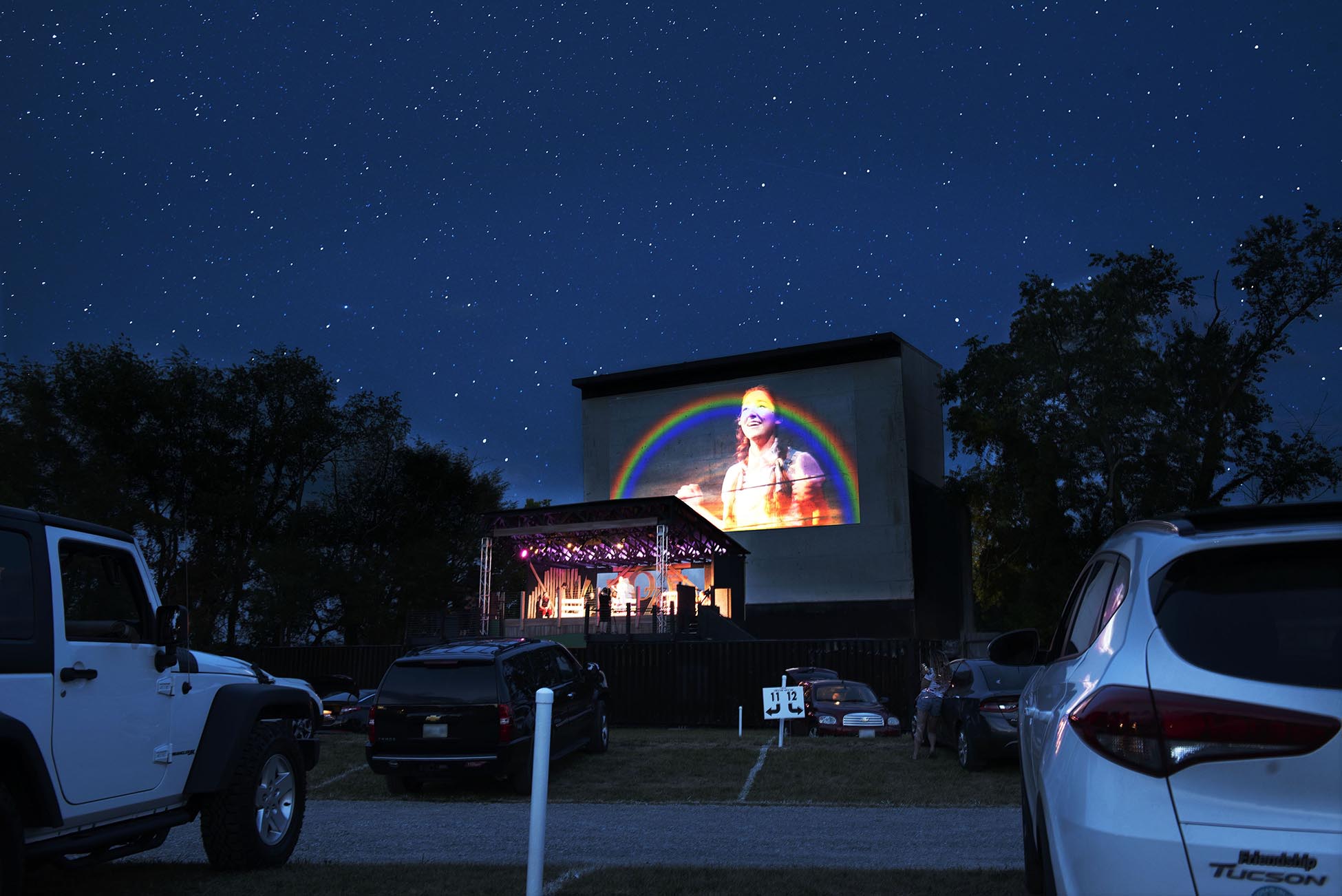
The Moonlite is innovative to the 10th degree – the only theatre venue of its type in the nation – and it is ongoing. But is it successful? By every measure. People from 35 states saw a play at the Moonlite in its first year, and the operation runs in the black. Although the Barter Theatre since has reopened in town, the intention is to keep Moonlite performances going on the weekends until and unless the movie-theatre property sells because, as Brown put it, “The shows are just so much fun!”
Rapid rise
When she became the first woman to be named producing artistic director of the Barter Theatre (and only the fourth person to hold the position in its 88-year history), Brown shocked literally no one. She had served as associate artistic director and head of casting since 2006 and was well known and highly respected.
“In my nearly two decades of board service with Barter Theatre, I have had the pleasure of working with Katy Brown, seeing firsthand her work ethic and watching on stage the tremendous final product of her artistic and directing capabilities,” said Kyle Macione, president of the Barter’s Board of Trustees, when Brown was promoted upon the retirement of her mentor, Richard Rose, who served in the role for 27 years.
She needs all three of these traits and skills in the humongous role in which she is excelling. Prior to the pandemic, Barter Theatre was an $8 million operation employing 130 fulltime employees and producing $34.4 million in annual economic impact for its small tourist town. Each year, approximately 145,000 audience members from across the region, nation and globe filled the seats of the Barter’s two theatres, which hold 507 and 167 seats. Amazingly, the Barter presented 25 to 30 productions annually.
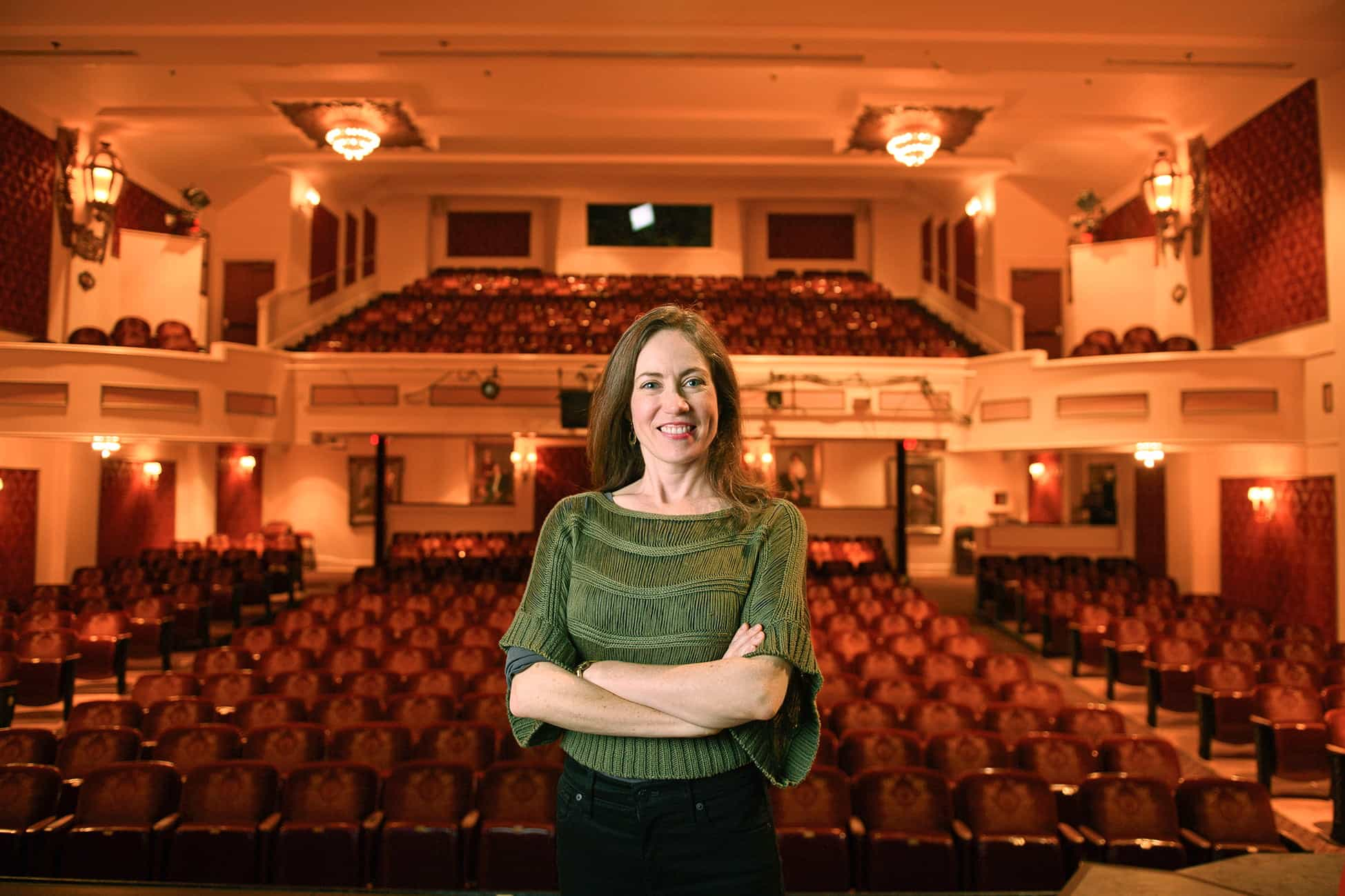
“By theatre standards, that number is insane,” Brown declared.
The Barter has consumed nearly all of Brown’s professional career, offering every ounce of challenge and growth she has needed, as well as the same sort of meaning and service she sought when choosing Berry College. In fact, she was introduced to Barter her senior year at Berry when attending the Southeastern Theatre Conference, which she described as “the” place to go as a theatre major if you wanted paid summer work.
There she met John Hardy, artistic director of the First Light Players, then Barter’s theatre program for young actors and audiences, and was offered a paid summer internship as an actor. Within two years she had been named artistic director of First Light Players, and soon she turned the struggling operation around, renaming it Barter Players and growing revenue from $72,000 to $773,000 annually.
“We changed its focus and how it served the public, and it took off,” Brown said. “Now it is one of the places young actors want to come and train. Our professional young artists perform in performing arts venues nationally but also at schools in rural Appalachia where children might otherwise never have access to quality theatre. At Berry, I learned that whatever you are doing, ask yourself, ‘What is in it for other people?’ Hardy and Barter taught me that theatre is about other people and how you serve them, and I was thrilled to be able to use this art form that I love as a service.”
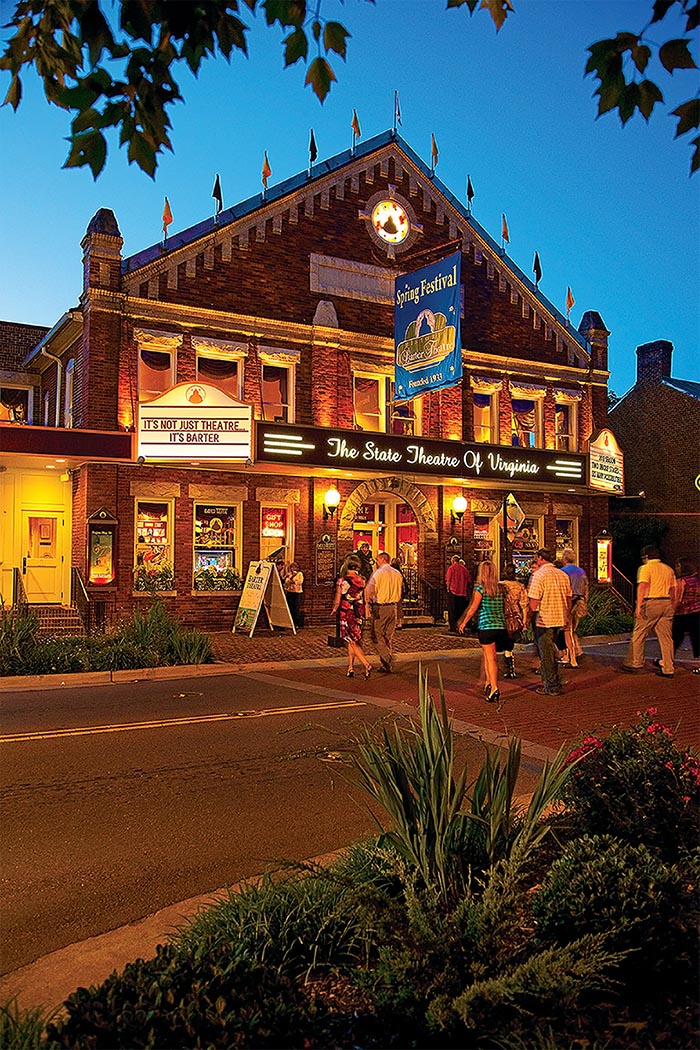
Five years after becoming artistic director of the Barter Players, she moved up to the No. 2 role at the Barter Theatre itself, and now, lauded for her talent and work ethic, she is running it all.
“I am really grateful I got a B.A. at Berry,” she emphasized. “I learned about every part of theatre – how to hang lights, make costumes, do choreography. When I got to Barter, if something needed doing, I pounced on it, and I was willing to learn anything and everything. I was a harder worker because of my training at Berry. I think that is why I moved forward.”
Once a dancer whose dreams were dashed by an on-stage injury the summer after her sophomore year at Berry – “I will always miss dancing. I loved it like a person.” – Brown has found that, creatively, directing is where she is meant to be, in addition to working with playwrights to bring their works to stage for the first time and adapting existing plays for presentation. She is deeply interested in the educational aspects of theatre, having once aimed to be an English professor and ending up a dual English/theatre major. In service to that passion, she has directed the Barter’s Young Playwrights Festival in Abingdon since 2002 and served as a coach and mentor for other actors since 1999. For Brown, casting calls offer a chance to provide a human spot – a moment of respite – during a tough day for actors, as well as the opportunity to guide them to success in a given role.
Perhaps more than anything, though, she finds joy in bringing Shakespeare to her stage.
“Michael Cooley’s Shakespeare classes at Berry were fantastic,” she said, “and I had a great explication script analysis class in theatre. Shakespeare has everything an English/theatre person could dream of.”
Through her efforts, Shakespeare now is performed each year at the Barter with support from the National Endowment for the Arts Shakespeare in American Communities Grant.
“I’ve taken out seats to enable the actors to go out into the audience to make Shakespeare as accessible as possible for our audience,” Brown said, continuing with a laugh: “I think I’d hang the audience upside down if necessary to get more people to experience Shakespeare!”
She is proud of the wide range of citizenry in Abingdon and the surrounding area who can relate to and talk about Shakespeare because of the Barter’s productions.
The start of it all
Brown’s crazy idea for the Moonlite wasn’t nearly as far-fetched as was Robert Porterfield’s plan in 1933 to bring actors from New York to little Abingdon at the height of the Great Depression to barter their performances for farm goods. After all, he figured, they had no work acting, and farmers had crops in their fields they couldn’t sell. Thus was born the aptly named “Barter” Theatre.
“With vegetables that you cannot sell, you can buy a good laugh,” Porterfield said.
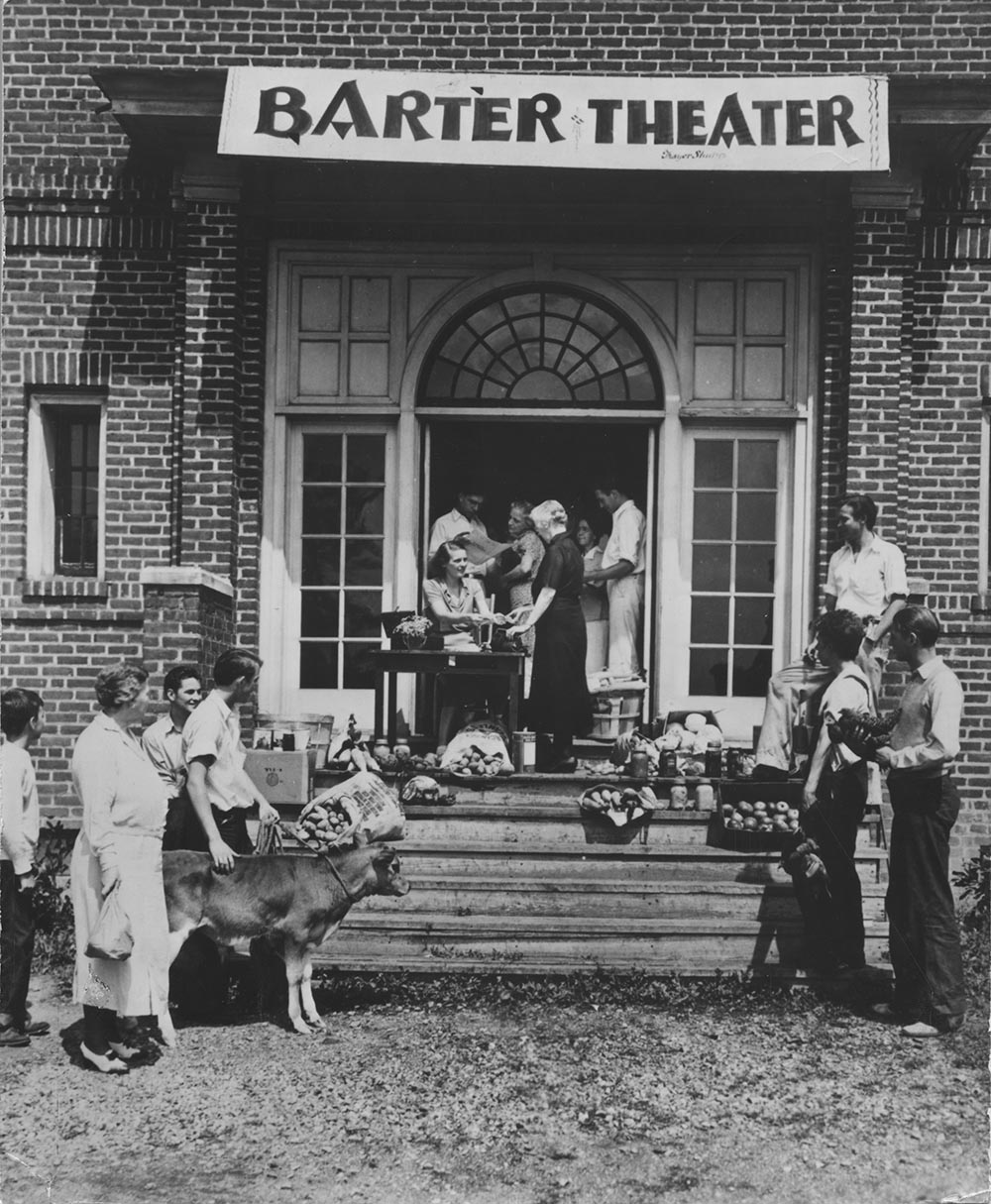 “Porterfield’s crazy idea worked,” Brown wrote for the Summer 2020 Virginia Capital Connections. “At the end of the first season, Barter cleared $4.35 in cash, two barrels of jelly and a collective weight gain of over 300 pounds. This theatre quickly established a reputation for providing exceptional live productions in a warm and welcoming atmosphere for people from all walks of life.”
“Porterfield’s crazy idea worked,” Brown wrote for the Summer 2020 Virginia Capital Connections. “At the end of the first season, Barter cleared $4.35 in cash, two barrels of jelly and a collective weight gain of over 300 pounds. This theatre quickly established a reputation for providing exceptional live productions in a warm and welcoming atmosphere for people from all walks of life.”
Although the theatre has remained in Abingdon, its reach has been both national and international, including Brown’s 2009 piloting of Barter’s national tours with her production of Of Mice and Men. The Barter was designated the State Theatre of Virginia in 1946 and awarded the first Tony Award for regional theatre in 1948. Famous names among Barter “alumni” include Ernest Borgnine, Gary Collins, Gregory Peck, Larry Linville, Ned Beatty and Patricia Neal, whose scholarship Brown received as an intern.
And while audience members no longer “trade ham for Hamlet,” they do trade canned food for admission several days a year, with all goods going to feed the hungry, of course.
heart, home, history
An Alabama native, Brown could not be more a part of Abingdon and Appalachia had she been born there; she has dedicated her artistic life to serving the people of the region.
“The important thing is that we [the Barter] belong to the people here,” she said. “They value story as much as they value food. We must be authentically Appalachian and accessible to all people. We are at our best when we mix world class with the folksy feeling of the area. We are most successful when we lean into our history and mix innovation with it.”
Brown on Berry
Looking back on her Berry experience, Presidential Scholar and honors student Katy Brown (98C) hails fellow students as some of her most effective mentors.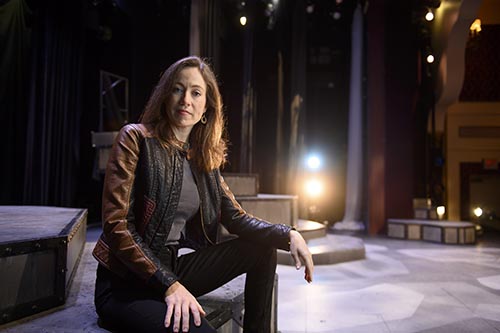 “Students were empowered to mentor and help each other,” she said. “The older students even taught the younger ones small, but important, things like how to get the cashier’s check needed for the Southeastern Theatre Conference. In particular, I remember Molly Misseri [Mercer (95C)], head of the Berry College Theatre Co., who taught us: This is how you apply to go to conferences, and this is how you get summer jobs. A lot of us worked because of Molly and others like her.”
“Students were empowered to mentor and help each other,” she said. “The older students even taught the younger ones small, but important, things like how to get the cashier’s check needed for the Southeastern Theatre Conference. In particular, I remember Molly Misseri [Mercer (95C)], head of the Berry College Theatre Co., who taught us: This is how you apply to go to conferences, and this is how you get summer jobs. A lot of us worked because of Molly and others like her.”
